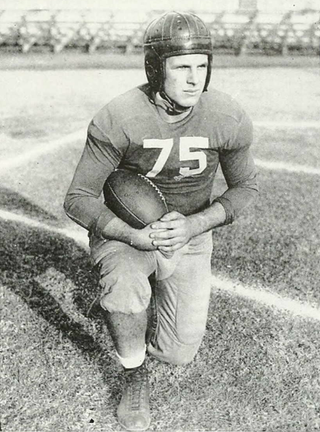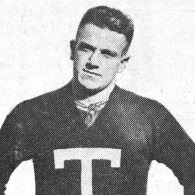
John Franklin Broyles was an American college football player and coach, college athletics administrator, and broadcaster. He served as the head football coach for one season at the University of Missouri in 1957 and at the University of Arkansas from 1958 to 1976, compiling a career coaching record of 149–62–6. Broyles was also the athletic director at Arkansas from 1974 to 2007. His mark of 144–58–5 in 19 seasons at the helm of the Arkansas Razorbacks football gives him the most wins and the most coached games of any head coach in program history. With Arkansas, Broyles won seven Southwest Conference titles and his 1964 team was named a national champion by a number of selectors including the Football Writers Association of America.
Patrick Travis Swilling is an American former professional football player who was a linebacker in the National Football League (NFL). He played for the New Orleans Saints, Detroit Lions, and the Oakland Raiders. He had five Pro Bowl appearances in his NFL career and was the Associated Press (AP) NFL Defensive Player of the Year in 1991. He served from 2001 to 2004 as a member of the Louisiana House of Representatives.

Joseph Fitzgerald Hamilton is an American former professional football player who was a quarterback in the National Football League (NFL), NFL Europe and Arena Football League (AFL). He played college football for the Georgia Tech Yellow Jackets, earning consensus All-American honors and winning the Davey O'Brien Award in 1999. After his playing career ended, Hamilton became an administrator and coach. He has served as the running backs coach for Georgia State University and currently works in the recruiting department for his alma mater, Georgia Tech.
William Marcus Fulcher was an American professional football player and college coach. He played college football at the Georgia Institute of Technology and then played pro ball for the Washington Redskins in the National Football League (NFL). Fulcher served as head football coach at the University of Tampa in 1971 and at his alma mater, Georgia Tech, in 1972 and 1973, compiling a career college football record of 18–15–1.
Maxie Callaway Baughan Jr. was an American professional football player and coach in the National Football League (NFL). Baughan played linebacker for the Philadelphia Eagles, Los Angeles Rams, and Washington Redskins. He later served as a linebacker coach and defensive coordinator for several college and NFL teams. Baughan played college football for the Georgia Tech Yellow Jackets.

Larry Cleo Morris was an American professional football player who was a linebacker in the National Football League (NFL), primarily with the Chicago Bears. The 1950 graduate of Decatur High School became an All-American playing college football for the Georgia Tech Yellow Jackets before his NFL career. "The Brahma Bull" was named one of the linebackers on the NFL 1960s All-Decade Team. He was sentenced to probation for his role in the Savings and loan crisis.

The Georgia Tech Yellow Jackets football program represents the Georgia Institute of Technology in the NCAA Football Bowl Subdivision in the sport of American football. The Yellow Jackets college football team competes in the Football Bowl Subdivision (FBS) of the National Collegiate Athletic Association (NCAA) and the Atlantic Coast Conference (ACC). Georgia Tech has fielded a football team since 1892 and as of 2023, it has an all-time record of 761–544–43. The Yellow Jackets play in Bobby Dodd Stadium at Hyundai Field in Atlanta, Georgia, holding a stadium max capacity of 51,913.

Ray Merril Beck was an American football player in the National Football League (NFL) for the New York Giants in 1952 and from 1955 to 1957.

Eddie Lee Ivery is an American former professional football player who was a running back for the Green Bay Packers of the National Football League (NFL).

John Henry Davis is an American former professional football player who was an offensive lineman in the National Football League (NFL), primarily for the Buffalo Bills. He played college football for the Georgia Tech Yellow Jackets, twice earning first-team All-American honors. Davis played in Super Bowl XXV, Super Bowl XXVII, and Super Bowl XXVIII. He was also with the Bills for Super Bowl XXVI, but did not play in the game due to a knee injury.

David Irenus "Red" Barron was an American football and baseball player. Barron was a three-sport letterwinner at the Georgia Institute of Technology. In football, he was named second or third team All American twice, first-team All-Southern four times, and was an inductee to Tech's Hall of Fame and the Georgia Sports Hall of Fame. He was also twice an All-Southern baseball player at Tech. His brother was Carter Barron.

William Lamar "Billy" Lothridge was an American football punter and safety who played in the National Football League (NFL) for the Dallas Cowboys, the Los Angeles Rams, the Atlanta Falcons and the Miami Dolphins. He played college football at Georgia Tech.
Andrew Shawn Jones is an American former gridiron football player. He played professionally for the Minnesota Vikings in the National Football League (NFL) as well as the Baltimore Stallions in the Canadian Football League (CFL). Jones was a four-year starter at quarterback for the Georgia Tech Yellow Jackets.
Conrad Stephen Ortmayer was an American football player, coach, and executive who served as the general manager of the National Football League (NFL)'s San Diego Chargers and St. Louis Rams.
Mike Kelley is an American former professional football quarterback. He played for the Tampa Bay Bandits and Memphis Showboats in the United States Football League (USFL). After the USFL failed, he joined the San Diego Chargers of the National Football League (NFL) as a replacement player during the 1987 strike. Eight years after his stint with the Chargers, he came out of retirement at age 35 to serve as backup quarterback on the Memphis Mad Dogs, a Canadian Football League (CFL) team. He played collegiately for the Georgia Tech football team. He was inducted into the Georgia Tech Hall of Fame in 1992.
Jimmy Robinson is a former American football wide receiver and retired wide receivers coach of the National Football League (NFL). He played for the New York Giants and San Francisco 49ers during his playing career. He was a wide receivers coach in professional football since 1984, coaching for the Memphis Showboats, Georgia Tech Yellow Jackets, Atlanta Falcons, Indianapolis Colts, New York Giants, New Orleans Saints, Green Bay Packers, and most recently the Dallas Cowboys.

Edward Stanley Prokop was an American football player. He played college football at the Georgia Institute of Technology and in the National Football League (NFL) in the 1940s. He was the first pick in the 1945 NFL draft for the Boston Yanks.

Harold Maurice Miller was an American football player. He played professionally as a tackle for the San Francisco 49ers of the National Football League (NFL) in 1953.

Albert Barnett "Buster" Hill was a college football player.











